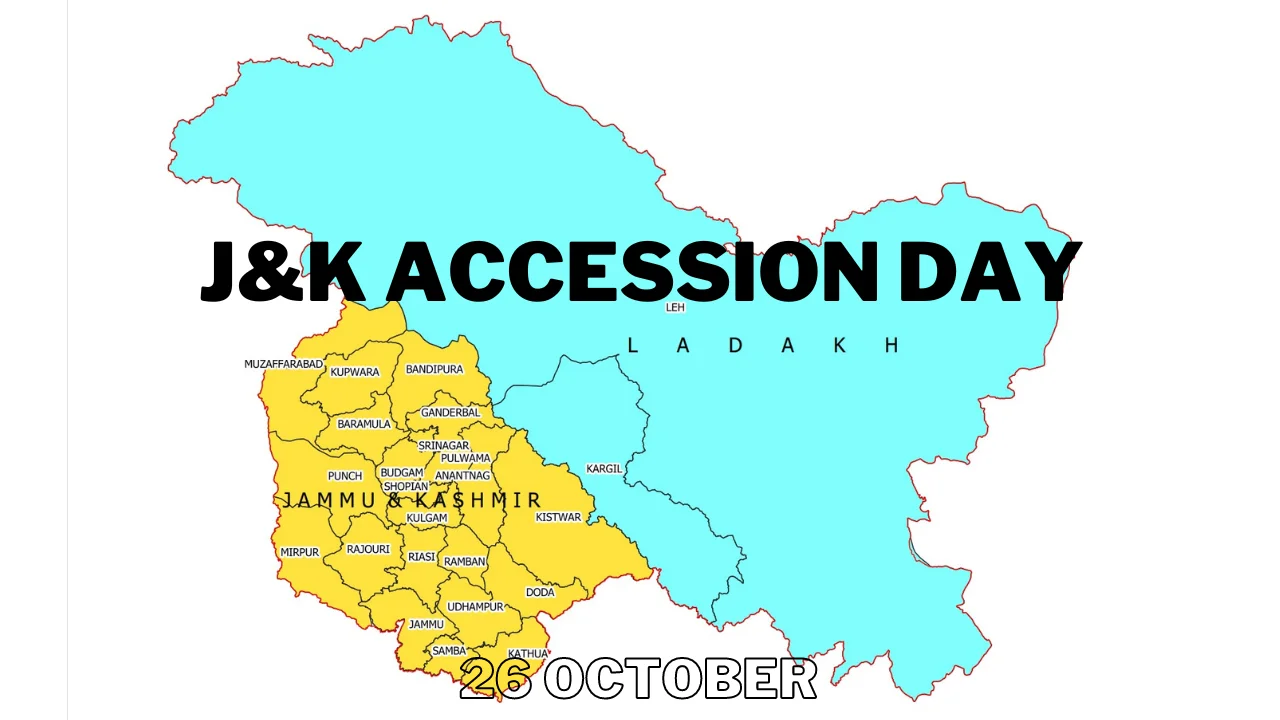J&K Accession Day 2024
October 26 is celebrated as a public holiday in India’s union territory of Jammu and Kashmir (J&K). This holiday is dedicated to commemorating the historic signing of the Instrument of Accession in 1947. This document played a pivotal role in the accession of the princely state to India and laid the foundation for the region’s integration into the Indian Union. It is an important day in the history of Jammu and Kashmir, marking its association with India.
About the Signing of Instrument of Accession
The signing of the Instrument of Accession on October 26, 1947, was a pivotal moment in the history of Jammu and Kashmir. Here’s some background on this historic event:
Background of J&K
At the time of India’s independence in 1947, the Indian subcontinent was divided into two newly formed nations, India and Pakistan. Alongside these dominions, 580 princely states had previously accepted the paramountcy of the British Crown through subsidiary alliances. According to the Indian Independence Act of 1947, these princely states were given the choice to remain independent, join India, or join Pakistan. The process of accession involved signing an Instrument of Accession (IoA) that outlined the terms of the accession.
Maharaja Hari Singh’s Dilemma
Maharaja Hari Singh, the last Dogra monarch of Jammu and Kashmir, initially chose to maintain the independence of his state. He signed standstill agreements with both India and Pakistan to preserve the existing status quo. However, his decision was soon challenged when the region faced incursions by Pathan tribal militias and Pakistani military personnel. Faced with this critical situation, Maharaja Hari Singh sought India’s assistance to repel the aggressors.
The Agreement
India extended its help, but on the condition that Maharaja Hari Singh would sign the Instrument of Accession. This agreement, signed on October 26, 1947, served as a pact between the princely state of Jammu and Kashmir and India. Lord Mountbatten, then the Governor-General of India, formally accepted the Instrument a day later. This momentous agreement provided the Indian Parliament with the authority to legislate on matters of Defense, External Affairs, and Communications about Jammu and Kashmir.
October 26 is a Public Holiday
In 2020, October 26 was officially declared a public holiday in Jammu and Kashmir to commemorate this historic event. This holiday serves as a reminder of the region’s integration into India and the significance of the Instrument of Accession in shaping the destiny of Jammu and Kashmir. It stands as a symbol of unity and solidarity between the region and the rest of India.
Union Territory of Jammu and Kashmir (UT of J&K)
The Union Territory of Jammu and Kashmir (J&K) is a region administered by India and consists of the southern portion of the larger Kashmir region, which has been the subject of a dispute between India and Pakistan since 1947 and between India and China since 1959.
Physical Location
J&K is bordered by the Indian states of Himachal Pradesh and Punjab to the north and west, and by the Pakistani-administered territories of Azad Kashmir and Gilgit-Baltistan to the north and west. The Line of Control (LoC) separates the Indian-administered territory of J&K from the Pakistani-administered territories.
J&K is a mountainous region with a diverse landscape. The Himalayas run through the northern part of the territory, while the southern part is made up of the foothills of the Himalayas and the plains of the Punjab region. J&K is home to some of the most popular tourist destinations in India, including the Kashmir Valley, and the Jammu region.
Demography of J&K
J&K is a multi-ethnic and multi-religious territory. The majority of the population is Muslim, but there are also significant Hindu, Sikh, and Buddhist minorities. The territory has a rich culture and history, which is reflected in its diverse architecture, cuisine, and arts and crafts.
J&K is an important economic and strategic region for India. The territory is home to several industries, including tourism, agriculture, and horticulture. J&K is also a major hydropower producer.
J&K Accession Day Significance
Jammu and Kashmir Accession Day holds significant meaning for various reasons, creating a complex and multifaceted narrative. Here’s a breakdown of its significance:
- Integration and National Unity: It marks the day in 1947 when Maharaja Hari Singh signed the Instrument of Accession, officially integrating the princely state of Jammu and Kashmir into the Dominion of India. This is seen as a key event in the nation’s unification and a symbol of national unity.
- Security and Territorial Integrity: The Day emphasizes the importance of Jammu and Kashmir for India’s national security and territorial integrity. It reinforces the nation’s commitment to protecting the region from external threats.
- Development and Progress: The Day can be seen as a starting point for development and progress in Jammu and Kashmir. Government initiatives and programs aim to improve infrastructure, education, and living standards in the region.
- The Day can also serve as a platform for expressing the political aspirations of various Kashmiri groups.
- The ongoing conflict in J&K and the human rights concerns associated with it cast a shadow over the Day.
Conclusion – Jammu and Kashmir Accession Day 2024
J&K Accession Day holds multifaceted significance, encompassing historical events, national aspirations, political viewpoints, and human rights concerns. It’s a day that sparks debate, reflection, and a call for understanding the diverse narratives surrounding this complex region. By acknowledging and addressing these different perspectives, we can move towards a future where Jammu and Kashmir find peace, security, and prosperity for all its people.
26th October 2024 Special Day
On the 26th of October 2024, the union territory of Jammu and Kashmir in India observes a public holiday, commemorating the pivotal signing of the Instrument of Accession in 1947. This significant day holds historical importance, symbolizing the region’s integration into the Indian Union. As people celebrate this holiday, it serves as a reminder of the historical events that shaped the destiny of Jammu and Kashmir within the larger framework of the Indian nation.
- JKSSB JE CIVIL Exam Date | Exam Pattern | Job Profile
- JKSSB JE Civil Eligibility
- JKSSB JE CIVIL Exam Syllabus & Pattern 2025
- Introduction To Financial Accounting | JKSSB Finance Account Assistant Exam
- Ladakh Police Constable Recruitment 2025 Notification, Eligibility
- JKPSC KAS Exam Date Out, Check Prelims Exam Date Here
- JK Police Constable Recruitment 2024 for 4002 Vacancies
- JK Bank Recruitment 2024 for Apprentice Posts, Apply Online
- JKSSB Supervisor Exam Date 2024 Out, Download PDF
- JKSSB Junior Assistant Typing Test Admit Card 2024 Out, Link
- JKSSB Inspector Admit Card 2024 Out, Admit Card Download Link
- JKSSB ASO Result 2024 Out, Direct Link to Download

Hello, I’m Aditi, the creative mind behind the words at Oliveboard. As a content writer specializing in state-level exams, my mission is to unravel the complexities of exam information, ensuring aspiring candidates find clarity and confidence. Having walked the path of an aspirant myself, I bring a unique perspective to my work, crafting accessible content on Exam Notifications, Admit Cards, and Results.
At Oliveboard, I play a crucial role in empowering candidates throughout their exam journey. My dedication lies in making the seemingly daunting process not only understandable but also rewarding. Join me as I break down barriers in exam preparation, providing timely insights and valuable resources. Let’s navigate the path to success together, one well-informed step at a time.












